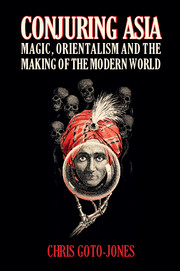Introduction: magic in the world
Published online by Cambridge University Press: 05 July 2016
Summary
First of all, I promise not to fill this book with puns about magic being tricky, or with a long series of bad jokes about things happening ‘as if by magic’. But magic is a tricky business, and the extent to which this is true has become increasingly evident to me as I have worked on this project.
For one thing, it's not very clear what magic actually is. Even leaving aside the deceptively difficult (and completely incoherent) question of the difference between ‘real magic’ and ‘fake magic’ (which will preoccupy us for much of the first two chapters as I search for some form of unifying theory), it's even tough to know when a stage magician has just performed something that you recognize as magic. Of course, it's always clear when they've failed. And their failure often has nothing whatsoever to do with the success of whatever feat they were trying to accomplish: a magician can successfully pull a rabbit from a hat or a coin from your ear without your really knowing how he did it, but such accomplishments can be cringe-worthily mundane in the hands of Uncle Geek while being transportingly magical in the hands of Professor Sparrowhawk.
So, magic is not an object, not a prop or a mechanism, not even a technique or an accomplishment. As least, not per se. Magic flows from the hands of a magician only when an audience feels magic happening. It is an interpersonal and intersubjective phenomenon. And that, more than anything else, is the secret to magic: a magician is one who causes you to feel that magic has transpired, no matter what has transpired.
Yet, magic is more than a feeling; it's also a discipline, at least in so far as it includes an accepted canon of texts, techniques, and technologies aimed at the performance of impossibilities. Magic has methods and methodologies, theories, debates, and disagreements. It has history. It involves research and development and ideas about progress; it demands practice and performance. It has culture. Even while all of this learning seems to be targeted at enabling magicians to perform all kinds of secret techniques (which is also true), in the end, it is really all focussed on enabling a magician to make you feel that he (or she, but usually he) has done something magical.
- Type
- Chapter
- Information
- Conjuring AsiaMagic, Orientalism and the Making of the Modern World, pp. 1 - 10Publisher: Cambridge University PressPrint publication year: 2016



